#asian culture in bl
Text
Turtles Catches Up With Old GMMTV: He’s Coming To Me Edition
[What’s going on here? After joining Tumblr and discovering Thai BLs through KinnPorsche in 2022, I began watching GMMTV’s new offerings -- and realized that I had a lot of history to catch up on, to appreciate the more recent works that I was delving into. From tropes to BL frameworks, what we’re watching now hails from somewhere, and I’m learning about Thai BL's history through what I’m calling the Old GMMTV Challenge (OGMMTVC). Starting with recommendations from @absolutebl on their post regarding how GMMTV is correcting for its mistakes with its shows today, I’ve made an expansive list to get me through a condensed history of essential/classic/significant Thai BLs produced by GMMTV and many other BL studios. My watchlist, pasted below, lists what I’ve watched and what’s upcoming, along with the reviews I’ve written so far. Today, I’ll cover He’s Coming To Me, how this show centers Thai-Chinese/Asian culture, shipper culture, and the brilliance of Ohm Pawat and Singto Prachaya. THIS IS A LONG POST.]
I’m gonna have to hold myself down for this one. He’s Coming To Me. This kind of show. HCTM is ABSOLUTELY the reason why I created this project watchlist in the first place -- to watch this kind of show. This show cements my utter respect and passion for the work of Aof Noppharnach. This guy’s work needs to be taught in schools.
I’m like -- after days of finishing HCTM, and furiously and hungrily rewatching episodes, I am still shaking my damn head at this show. I knew it was great, but y’all didn’t prepare me for ITS GREATNESS. (And to be watching it the same week as Our Skyy 2 x Bad Buddy x A Tale of Thousand Stars -- it’s been an Aof-themed moment, and I’m a touch overwhelmed by EVERYTHING I’ve absorbed.)
I am actually contemplating -- I’m seriously contemplating this! -- if I like this show better than either Bad Buddy or Moonlight Chicken. I know, I KNOW. I’m not talking about the story, the structure, the filming, the writing and direction. I’m literally just talking about my own damn preferences. I might just LIKE this show better, for what it held, what it told, and how the show showed so much respect for its story.
And there’s a lot I want to touch on in this piece, so as usual, a little list for myself:
1) Where this show came from vis à vis the watchlist, and what I think it meant by way of previous BLs
2) The Asianness of the show and how it transcended the usual BL tropes
3) A celebration of Aof’s favorite themes, and how cool it was to see them being born in HCTM (including the theme of young/first love that I haven’t seen before in his work)
4) A hopefully brief and not angry reflection on shipper culture, homophobia, Ohm, Singto, and how that affected HCTM in the annals of Thai BL
Without having seen his My Dear Loser work, or his screenwriting for Gay OK Bangkok 1 and 2 (which I plan to watch after the OGMMTVC is over, in preparation for Only Friends): HCTM is the first full Aof vehicle to enter my watchlist. So just quickly looking behind me: I’ve had shows like Love Sick, SOTUS, Together With Me, Love By Chance -- shows that began to toe the line, then define the line, then sharpen the line of what BL was. As I wrote in my Love By Chance review last week, I felt that LBC was the first show on my watchlist that felt like a true derivative BL, complete with tropes that had been born during Love Sick and SOTUS, and sharpened over those first few years of the Thai BL industry growing.
So it’s 2019 now, and we get He’s Coming To Me, both written and directed by P’Aof. Tropes? No tropes. What a flip from LBC.
Instead, we get an absolute head-first dive into many of the themes that we see Aof continued to play with in his later works. For me, HCTM evoked Moonlight Chicken the most, especially for what I call the Asianness of this show -- Aof’s unabashed focus on Asian cultural themes and threads that create structure and movement for his characters.
Before I get ahead of myself, I want to thank @telomeke very deeply for chatting with me about how I could learn more about Thai-Chinese culture, because themes and behaviors related to Thai-Chinese demographics are clearly common in Thai BLs, and I’ve felt that it behooved me to learn more about the culture (or as much as I can from the internet) as I continue to review these shows. But @telomeke reminded me that a lot of the assimilation of Chinese cultures and populations mirror the cultural mixing that took and takes place in Malaysia, where a part of my family hails and where I’ve spent a good portion of my life. So I’m relieved that I actually understand more about Thai-Chinese culture than I gave myself credit for, BUT -- that’s only a caveat, because I still have so much more to learn.
I say this because I’m using this word, “Asianness,” to describe in part at least one impression I have about HCTM, which is taking seriously the theme of ghosts and what role ghosts play in a human’s life. We see very often in Japanese doramas the practice of praying at an altar honoring past ancestors -- ancestor culture and worship are big in Japan, and the doramas don’t shy away from that. We see temple trips all the time in doramas and BL doramas -- especially during New Year’s. (Our Dining Table being just the most recent one.) We see Buddhist temple culture in Thai BLs often -- in KinnPorsche, in Bed Friend, in Big Dragon, and very especially in Moonlight Chicken.
I think what I want to point out here, if I can say it eloquently, is that a Western viewer might find more notable in an Asian drama, than in a Western show, the inclusion of practices of spirituality. In the West, spirituality might be indicated by a trip to a church, or prayer. But it strikes me -- and maybe this is because I’m a first-generation Asian-American, my eyes open to ALL the differences between my culture and America -- that Asian dramas incorporate the practices of spirituality more seamlessly, because practices like lighting an incense stick and giving a quick prayer before breakfast is more culturally embedded in places like Japan or Thailand. The practice is there, and you just do it, because that’s what you do for your culture. (I often see a stick of incense lit and burning next to a plate of fruits in the early mornings when I jog past Thai restaurants. It’s just -- what you do.)
It struck me, and I still wonder about it, if Western viewers may have thought that Thun was going overboard with his interest in Thai-Chinese Buddhist practices, including being so diligent about offering alms to the passing monks, going to the temple for merits, and keeping electric incense sticks on him to make sure that Med wouldn’t disappear. An auntie on Whatsapp might cock a curious eyebrow, but also regard Thun as a “good boy” who’s devoted to the temple.
In any case, this struck me particularly deeply, because I think, if P’Aof had been a little more abashed, that he could have toned this theme down -- the theme of the everyday practice of Buddhism.
And he didn’t. He didn’t tone it down. He leveraged it as THE major theme of the drama: that ghosts exist in Thai-Chinese-Buddhist culture and practice, and that some people can communicate with ghosts, including both Thun and his mom.
The ABSOLUTELY wonderful @telomeke affirmed this for me, writing so eloquently: “Underlying HCTM is an unshakeable belief in the spirit world, and it's also a given ... for a majority of people in SE Asia and Thailand in particular that the spiritual realm is as much a part of the everyday world as much as the physical reality of what we can see and touch.”
The reason why I’m hammering on this in particular is because it categorizes the show as one that is utterly representative of A SPECIFIC CULTURE -- just like Moonlight Chicken, with its commentaries on spiritual and economic practices of the particular place of Pattaya. @telomeke, I know you have specific feelings about the ending of HCTM, which I’ll get to in a moment, but I think for me, the ending of HCTM is deeply satisfying BECAUSE of this connection to Thai-Buddhist culture, what it says about ghosts and spirits, and how they continue to be incorporated in the ongoing life of a young Thai adult like Thun. AND, I appreciated that the ending skirted, just slightly, what we might have expected about someone losing their lover (à la Eternal Yesterday). Thun only temporarily lost Med... but Med still doesn’t quite exist. And I think there’s layers there that I’ll hopefully get to teasing out, either here or in a future post.
Going back to BL tropes and structures... I mean, HCTM was just like, yo, I’m gonna play in another ball field. I’ll have more thoughts on this after I watch Dark Blue Kiss, but at least, as far as I’m aware WITHOUT having seen DBK yet, that it’s not until late 2021 that P’Aof begins playing in the BL sandbox, takes his toy dump truck, and turns the tropes upside down in Bad Buddy.
And I see, in HCTM, P’Aof laying the groundwork for the themes that he DOES love, that I happen to love, and that get repeated in his oeuvre:
- The theme of community: the need for young and old queer individuals to interact with other queer individuals (most recently depicted in OS2/BBS/ATOTS)
- The theme of NOSTALGIA: Med having never left his moment 20 years prior, listening to the same music of Thun’s mom’s generation (nostalgia being most recently depicted in Moonlight Chicken)
- The parable of 1,000 stars: what it means to be the last star on which to make a wish (most recently depicted in ATOTS and OS2/ATOTS)
- The anguish of coming out: Thun, Uncle Jim, Li Ming, Pran coming out to Dissaya -- all heavy, all impactful, all different stories that carry heaviness and their own meaning to each of these incredible characters
And there’s so many more. But what I really want to do, to get up on the rooftops that P’Aof loves so much, and YELL TO THE AIR is:
THE GENIUS, THE SHEER GENIUS, of linking these themes -- many of these as ASIAN themes! -- to specific issues that face the queer community, such as coming out, and being invisible (like a ghost) in a majority cishet society.
GAAAAAAAAHHHHHHHHHHHH. Oh, the pain in my heart. This is exactly what I wrote in my notes while rewatching the show: “This is the first time we get Big Cultural Themes outside of issues with the queer community -- and Aof LINKS the Big Cultural Themes WITH queer issues -- the brilliance of it all.” Just like he did subsequently in Moonlight Chicken.
What was so beautiful to me about He’s Coming To Me -- and how it was channeled with GENIUS TALENT AND GRACE from Ohm and Singto -- is that, unlike Moonlight Chicken, this was the story of one young man who needed to sort out his feelings. And there was another young man, a young man who was killed, who HAD begun realizing his feelings, but was trapped by station (from a rich family) and role (the only son in a family). Med even said, it would have been impossible for him to come out as the only son of his family.
As far as we knew, Med had only come out to Kwan, Thun’s mom, before he died. Med may have very well been attracted to other men before he died -- but we see him VISCERALLY attracted to Thun, and vice versa, and that burst of first love for both young men, IN THE CONTEXT OF Thun’s spiritual practice and abilities to BRING Med to “life” in Thun’s life -- I mean. I’m shaking my head. It’s a parable for manifesting what you want in your life, and making it happen.
And yet, what HCTM also touches on, is that many times, you DON’T get what you want in life. Med WILL disappear one day. He will be reborn. It wasn’t his time at the moment of the ending, but it will be his time one day. Thun only has Med temporarily -- we don’t see the WHEN of that.
BUT. I would posit (and @telomeke and @wen-kexing-apologist, I wonder what you think of this), à la OS2/Bad Buddy, that P’Aof is OKAY with us not seeing this, and not necessarily considering the ending of HCTM to be a happy ending for Thun and Med. Because he knows -- and he knows that his Asian viewers know -- that Med WILL leave Thun one day. Not yet, though. Thun still has a little time to grow wiser and older and stronger. But Med WILL disappear one day. He had been hinting at it all throughout every episode of the series. He will have to leave Thun’s side.
I think the way the show ended was graceful. It leaves that door open for Med to find his rebirth, because was a good kid and deserves to be reborn in a happy life. It allows Thun time to grow through his first love -- first love being such an important theme to this show. It’s COMPASSIONATE to Thun, very similar to me to the kind of compassion that P’Aof showed to Uncle Jim throughout Moonlight Chicken, and just now in OS2/ATOTS to Phupha. But it’s also rooted in the SPIRITUAL REALITY that Med WILL leave -- just not yet. And P’Aof is saying, I didn’t need to show y’all, because y’all Asians already know, Med’s outta here one day.
The other thing to note about the ending is that P’Aof had already shown a tremendous amount of Thun’s pain. Thun wasn’t necessarily HAPPY in this show. He was curious, exploring, and loyal to Med. While Thun is clearly a young man who DEMONSTRATES happiness -- MY GAWD, the 19-year-old smile of Ohm Pawat!!! -- I wouldn’t say that he was a happy child. He lost his dad young. He was SCARED as hell for potentially letting his mom down. And: he had a lot of secrets to keep. The secret of being gay. The secret of being able to see and talk to ghosts.
“He’s coming to me.” Thun comes out, twice. He’s gay, and can see ghosts.

Even though others can’t see ghosts, I can. Even though others aren’t gay, I’m gay. Mom: I’m different.
When Thun sobs for Med while holding onto the jar of stars in his bedroom. When Thun spins around, looking for Med on the rooftop in episode five. When Thun calls for Med and Med isn’t there. Thun is alone. He is alone with his secrets, and Med is not there -- he is NOT coming to Thun in those moments -- and Thun is left alone, different and unique, as he has been his whole life.
I’d posit that that uniqueness is particularly difficult to deal with in collectivist Asian societies as in Thailand -- which led, in part, to Thun not knowing the language of his feelings as he came out to Med in episode five on the rooftop, and being SCARED, to his bones, to come out to his friends and his mom in episode six.
For 2019: I see this show as being ahead of its time, way ahead of its time. I have lots of theories as to why this show isn’t considered a more striking part of the canon of Thai BLs, and the incredible @bengiyo and @shortpplfedup have helped me to understand the magnitude of the impact that P’Aof made in breaking up the KristSingto ship to pair Singto with Ohm -- and how the fan shippers came for HCTM, and pushed GMMTV to hide this show for years before finally releasing it on YouTube with subs.
But besides that fucking bullshit, which I’ll return to in a second, I also want to note that maybe -- considering that we have more years now, after 2019, to consider the massive trove of Thai BLs that exist now -- the skirting of the still-nascent BL tropes framework was too early for many when this show came out. As I’ve demonstrated here in this piece -- this show’s complicated. There’s A LOT A LOT. I mean, I’m in love with P’Aof’s work because I LIKE HAVING A LOT in my shows. But you go a flip side and you get Together With Me and MaxTul with love bites and throaty kisses (in the words of Seinfeld, not that there’s anything wrong with that).
HCTM is heavy. It carried a lot that wasn’t overtly sexual by nature, like many BLs at that moment in 2019 and right beforehand (randy Perth, randy MaxTul, etc.).
I understand from @bengiyo and @shortpplfedup that, because Ohm needed to move on from Make It Right and the OhmToey ship due to Toey leaving BL after MIR, and Ohm joining forces with Singto, that Ohm received massive criticism, and continues to be a subject of criticism and bullying today (some of which I’ve seen on this site). And that Singto was also the subject of online bullying as well.
With all of this in mind -- Ohm, Singto, and the unique nature of HCTM -- I’m continuing to mull over the issue of homophobia in shipper culture. If BLs are reduced down SIMPLY to the pairings that lead these shows -- and that there’s an EXPECTATION that the shows NEED to depict certain acts of queer sexuality, SPECIFICALLY among actors who identify as straight -- that seems straight up homophobic to me.
I can see HCTM being too ahead of its time to begin shifting that paradigm. I’ll see what Dark Blue Kiss does next in the Aof oeuvre from this purview, but what I want to get at is:
IT IS CRIMINAL THAT HCTM ISN’T MORE WIDELY KNOWN. This show is affecting me literally at the same level as Bad Buddy and Moonlight Chicken.
What HCTM HELD by way of Asian culture and spirituality, by the RESPECT IT HAD for the experience of first young queer love, by LEVERAGING the ABSOLUTE BRILLIANCE OF ACTING OF OHM AND SINGTO (omg, AND SINE INTHIRA, are you kidding me?!?!?), and, oh shit, by BRINGING THAT ALL TOGETHER? To TELL a story of queerness and spirituality in Thailand?
Fuck. I’m just shaking my head. If it’s too much for the shipper folk, then... okay, go off. Leave the good stuff to me and the fam that GETS IT — the fam that gets that what we’re watching is ART, and not intended vessels for fantasy and fetish.
Last notes. I just want to say that in my SOTUS reviews, that I theorized that Singto would be brilliant when paired with a really good actor, and HCTM proved it to me. If it weren’t for this fucking shipper bullshit, I would have liked to see Singto and Ohm paired again.
Ohm is probably the most prevalent actor on my Thai BL list. I get that he was nicknamed “the king of BL,” and that he’s been the target of bias for that label and his predilection for being utterly brilliant in telling queer stories (thank you to @bengiyo and @miscellar for helping to fill me in on this).
Let me just say that this man is a goddamn MASTER. @shortpplfedup nailed it in her Ohm appreciation post. @absolutebl summarizes why Ohm is singular in this BL space. Shippers who want to bully the mans, bring him down or whatever, spread misinformation, I want to say, angrily and rudely -- fuck off, and be afraid of talent in y’alls lives.
With the tangle of homophobia and cyberbullying that seem to have an overstated impact on the Thai BL industry, it is a damn shame that Ohm doesn’t get more of his flowers, because he makes shows better. I mean: this guy OWNS ROOFTOPS. Episode five of HCTM?! Episode five of Bad Buddy?! Get this guy on a rooftop and he will SLAY. Pair him with people -- Singto? Nanon? Perth? OHM MAKES THESE GUYS BETTER ACTORS than they ever were previously.
I say the following, in all honesty, with a touch of disdain, of condescension, and sadness, for the people who don’t watch this show because it doesn’t have pectorals or hot make-out sessions, and because it features actors that many fans might want to bully:
HCTM does not have the reputation that it deserves. It’s not just a good show. It’s an HONORABLE show. For me, it pays homage to Asian cultures and practices that I relate to. It features a story of queer revelations and love that is written with passion and respect. It features probably the best acting I’ve seen so far on my watchlist. And it features two actors who were willing to subvert expectations, at the risk of their own careers, to tell this story, as written and directed by one of of the most brilliant, subversive, experimental, and creative filmmakers I’ve ever watched in Aof Noppharnach.
I want and need BL fans to appreciate Asian culture more in these shows. And I want and need BL fans to appreciate human behavior development as well. Because P’Aof is telling stories out here, stories that can enrich our lives. I wrote in my Bad Buddy thesis that BBS will be required viewing for my children. HCTM joins that list. HCTM makes me want to be a better Asian mother, and to make a world for my children where the experience of first love and coming out can be regarded not with pain, but with celebration and joy.
[It’s going to take me a while to get over HCTM, but I’ve already begun Dark Blue Kiss, and am having a FABULOUS time with it. That opening theme! P’Aof and JOCKS! Yum. Another frappé, please.
Here’s the updated list! Much to the chagrin of everyone-I-know-on-Tumblr (I’M SORRY @shortpplfedup), I’m adding a VERY fast rewatch of ATOTS. Blame it on Our Skyy 2. I’ll want to watch ATOTS after the cinematic affair that is ITSAY, and after I’ve seen P’Aof do his thing on two existing series in DBK/Kiss and Still 2gether. ATOTS was my very first P’Aof series, and I want to rewatch it in chronology.
Here we go. As always, I’ll take recs, comments, etc.!
1) Love Sick and Love Sick 2 (2014 and 2015) (review here)
2) Make It Right (2016) (review here)
3) SOTUS (2016-2017) (review here)
4) Make It Right 2 (2017) (review here)
5) Together With Me (2017) (review here)
6) SOTUS S/Our Skyy x SOTUS (2017-2018) (review here)
7) Love By Chance (2018) (review here)
8) Kiss Me Again: PeteKao cuts (2018)
9) He’s Coming To Me (2019)
10) Dark Blue Kiss (2019) and Our Skyy x Kiss Me Again (2018) (watching)
11) TharnType (2019)
12) Senior Secret Love: Puppy Honey (BL cuts) (2016 and 2017) (I’m watching this out of order just to get familiar with OffGun before Theory of Love -- will likely not review)
13) Theory of Love (2019)
14) Dew the Movie (2019) (not an official part of the OGMMTVC watchlist, but I want to watch this in chronological order with everything else)
15) Until We Meet Again (2019-2020)
16) 2gether (2020)
17) Still 2gether (2020)
18) I Told Sunset About You (2020)
19) Manner of Death (2020-2021) (not a true BL, but a MaxTul queer/gay romance set within a genre-based show that likely influenced Not Me and KinnPorsche)
20) A Tale of Thousand Stars (2021) (review here)
21) A Tale of Thousand Stars (2021) OGMMTVC Fastest Rewatch Known To Humankind For The Sake Of Rewatching Our Skyy 2 x BBS x ATOTS
22) Lovely Writer (2021)
23) I Promised You the Moon (2021)
24) Not Me (2021-2022)
25) Bad Buddy (2021-2022) (thesis here)
26) Bad Buddy (2021-2022) and Our Skyy 2 x BBS x ATOTS (2023) OGMMTVC Rewatch
27) Secret Crush On You (2022) [watching for Cheewin’s trajectory of studying queer joy from Make It Right (high school), to SCOY (college), to Bed Friend (working adults)]
28) KinnPorsche (2022) (tag here)
29) The Eclipse (2022) (tag here)
30) My School President (2022-2023)
31) Moonlight Chicken (2023) (tag here)
32) Bed Friend (2023) (tag here) (Cheewin’s latest show, depicting a queer joy journey among working adults)]
#he's coming to me#hctm#ohm pawat#singto prachaya#thun x med#med x thun#thai bl industry#shipper culture#asian culture in bl#asian culture in thai BLs#turtles catches up with old gmmtv#turtles catches up with thai BLs#turtles catches up with the essential BLs#the old gmmtv challenge#ogmmtvc#backaof noppharnach#aof noppharnach
207 notes
·
View notes
Text
I simply wish that when people did color theory based meta for BL works they did so with the knowledge or acknowledgement that colors mean different things in different cultures instead of solely from an ethnocentric pov
#last twilight#bl meta#gmmtv bl#chaos pikachu speaks#like any meta about gmmtv bls tends to do this and like#red typically references things like luck marriage celebration and not anger in East Asian cultures??#like the colors in the Thailand flag means life blood (red) purity (white) and the monarchy (blue)#colors mean different things in different cultures I'm begging y'all#to stop channeling bandit keith#twins the series
170 notes
·
View notes
Text



We love a boy who's not willing to keep himself in the closet or hide that he's dating someone he loves. But also just... how depressing that he has to say all this.
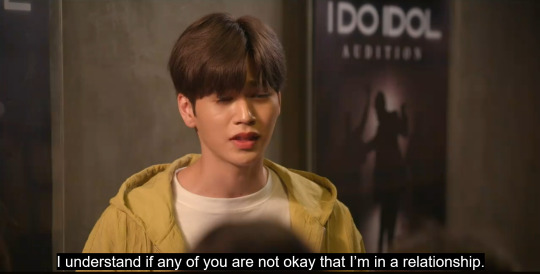
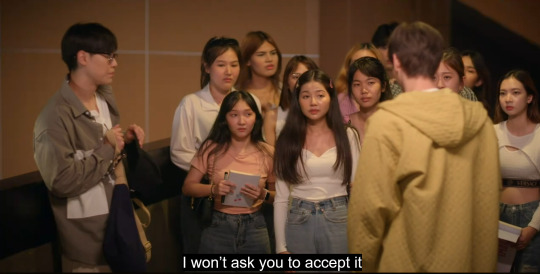

#cherry magic th#cherry magic thailand#cherry magic thai#jintamin#bl drama#thai bl#bl series#thai series#asianlgbtqdramas#asian lgbtq dramas#thai bl series#thaibl#thai bl drama#thai drama#ugh idol culture
85 notes
·
View notes
Link
No but srsly I am baffled how this page is not more popular? This is literally a collection of A+ recipes for discourse??
ESPECIALLY this part

Just a few months ago I was whining how we need someone to do proper research about the whole BL industry, shipping culture, fandom behavior and history to disprove all the false or outdated assumptions that constantly get thrown at shipping culture and BL fandoms, while positive aspects get ignored completely.
AND NOBODY TOLD ME there is already this huge ass collection of all kinds of academic researches on this page including links and sources and documentation of how queer-phobic and sexist the whole anti movement was and still is??
They even go into psychology of why a lot of women like m/m or f/f content, nonbinary genders and why many gay men actually like romantic BL over hypermasculine ‘gay comics’
(note: this does not mean we don't have issues in fandom and industry! We should be aware of them as well and fix them but shooting at the wrong people doesn’t help anybody)
#there are two kinds of f-words that get thrown around in discourse which trigger me hard because they are 99% used wrong and harmful#a lot of people don't even realize how much the whole shipping and BL culture helped to get actual canon LGBTq characters on screen#bl dramas#bl drama#thai bl#japanese bl#korean bl#LGBTq#queer media#queer asian media
177 notes
·
View notes
Text
I'm sorry, do people kinda forget that BLs have to make money to make more BLs? Or have they not touched grass in so long that they've forgotten?
Media needs to make money for there to be more media made.
Are people expecting these people to work for free? For min wage? It's understood that being a celeb is profitable so why are people complaining when it comes to BLs? I've never, in India or the West seen so many companies, individuals or stories actively advocating for equal rights and even then I see people say shit like this. Have they forgotten that they are people who need to cloth, feed, live in their ASIAN countries?
How is this nuance getting lost? Tumblr might brainwash you into thinking all money is evil (evangelical christian ideology, mind you) but it's not. It has, would you believe, nuance to it.
#thai bl#thaibl#asian bl#asian media#kinnporsche#love in the air#the eclipse#gap the series#big dragon#capitalism#vice versa#gmmtv#be on cloud#star hunter#a boss and a babe#my beautiful man#japanese bl#korean bl#the eighth sense#BL isn't counter culture like in the west#because it doesn't have to be#desi bl#desi blr
77 notes
·
View notes
Text
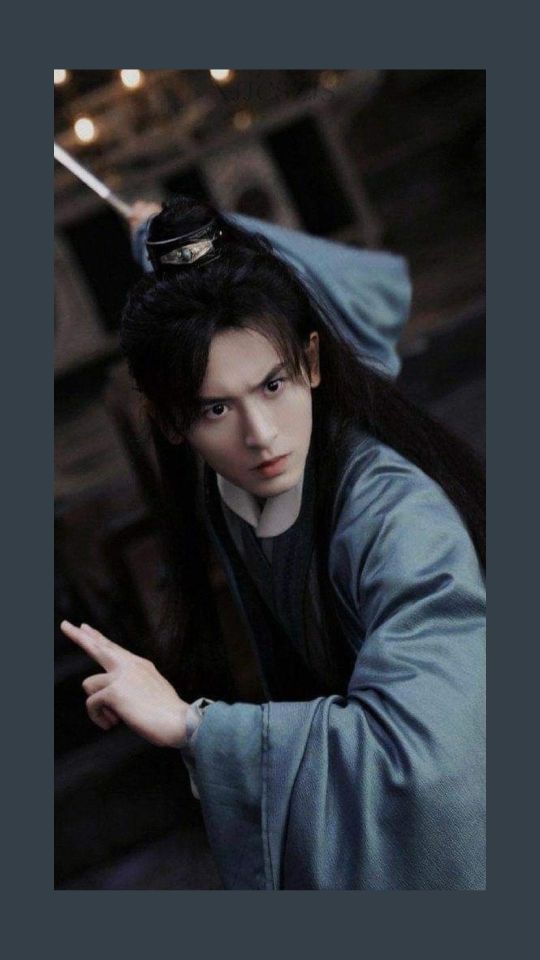
Las habilidades de cintura de A-Xu se han entrenado desde la infancia, ¿no es así?
#Zhou Xu#word of honor#zhou zishu#wenzhou#wen kexing#bl ships#fantasy#asianlgbtqdramas#asian lgbtq dramas#bl drama#bl series#lgbtlove#love#chinese boy#chinese#chinese culture#chinese series#chinese bl#asian boy#asian#asian men#asian bl series#asian bl drama#woh
9 notes
·
View notes
Text
So i was having a lovely conversation with @rythyme about the current rapid evolution of the BL industry, specially in Thailand - looking at the impact KinnPorsche is having, everywhere, at the moment - and it led us to a path where i was able to articulate something i’ve been thinking about or a while in regards to BL as a genre and how it relates to (and is) LGBTQ+ media.
BL might have its roots as a genre made for fangirls as fanservice, but the reality of it is, it is ALSO queer media and as the world at large embraces LGBTQ+ identities(i use the term embrace loosely here, we are all aware of the hurdles we face still), the lines have blurred into what people consider just BL - as fangirl fanservice - and LGBTQ+ content.
That does not mean that there isn't just fanservice for the sake of it out there, not every piece of media has to be nuanced and whatnot (we all like chicken nuggets every once in a while people, don’t lie, five course meals are not always where its at), but it does mean that there is more media that lands in the blended space. I believe BL media is and should be qualified under LGBTQ+ media. Bad buddy is a great example. It is 100 percent a BL, ticks all the boxes, but it is also 100 percent a coming of age, nuanced love story between two boys that tugs at your heartstrings and makes you want to go through the joy and anxieties of falling in love. That has a lot to do with the Director of the show, P’Aof, a very talented director, and an out gay man. Watching his reaction/review videos to the show, along with his peers who are also queer men, specially for the final episode, has been one of the best experiences of my life. It was hard to put into words, but hearing what these older queer/gay men had to say about this show, their lives, their experiences, the differences between their youth and today. It was mind blowing, specially because they are from a whole different culture than mine, and as my older sister who is in their age range said: “you’re watching/learning queer history.” It was both touching and a great learning experience.
BL is a genre that can be multiple things at once (like any other), but what lends itself to the blending I mentioned before is that we are not only seeing the industry as a whole growing with its fanbase, but also the fact that more LGBTQ+ voices are getting involved in the making and distribution of it.
Rythyme made a point in our conversation, “BL as a genre despite its shortcomings has always been, at its core, both queer and transgressive and it's hard to draw those lines between what's made for the ‘BL fangirl’ vs the ‘queer person’ bc those boundaries are super blurred” And i agree with that statement, because many of those BL fangirls the genre was aimed at turned out to be queer people later in life. They mentioned listening to a talk by an older Japanese lesbian who was an OG BL fan from the start of it all, and who discussed how BL helped her discover her own queerness, which was a lightbulb moment for Rythyme as they listened to it.
And that’s the thing. BL culture in the east, and slash culture in the west, they both started labeled as “fanservice for the fangirls”, and their similarities don’t end there, they are both movements that have led a lot of queer people in a journey of self-discovery. My sister @teland has almost 15 years+ on me, and as she put it:
I can't count the number of queer people of all genders and ages and everything else who I've spoken to over the past 20-odd years about slash, bl, and other intersections of queerness, fantasy, and *hope* who have said to me:
"This is where I found myself." "This is how I learned who I was." "This is how I wrote myself into my own body." "This is how I learned how to draw the boundaries of my self." And so on, and so forth.
There is nothing more queer than taking identity/self/sexuality/gender and remaking it in our own images for the sake of learning ourselves.
So yeah. i am in no way making light of, or ignoring, the fact that the fetishizing that has gone on since its inception isn't a thing (i am not a gay man, i can't speak for their struggles or issues with said fetishizing), but i feel it disingenuous to deny the fact that it, and the people it was/is aimed for have evolved.
There's surely someone out there better qualified, and with more energy than me, to address the other, more problematic side of this whole thing, where it lacks and where it fails, and I wish them all the luck. I'm genuinely just. So happy to see the growth and evolution of it as a whole. It brings me untold joy, and when there are just so many things in the world that aim to take the joy away from our lives, I want to embrace all the things that give it to me.
Now give me more GL stuff lol.
#Thai BL#Boys Love#LGBTQ+#LGBTQ+ media#asian lgbtq dramas#i am SO SORRY about how long this is#i have so much to saaaaay#i mean im leaving out a bunch of other stuff that brings even more nuance to my argument#like cultural differences#how lgbtq+ rights are being fought over as we speak in the countries that are the leading exporters of BL#and my thoughts on how revolutionary it is that this content IS so popular there and worldwide#and how i want to watch the evolution and growth of this genre and watch how it impacts the fight for those rights#and so much more oh man#someone send me to bed
216 notes
·
View notes
Text
So this post was kind of inspired by this post by @thequeenofsastiel and the comment I made on it. Instead of replying with more comments I thought I'll just make a post about it. So whoever is interested in knowing why there is significant lack of kissing for official couples in the BLs or Asian dramas, keep reading.
Kissing is mostly associated with sexual acts in most of the Asian countries. Couples (het or gay) who are officially dating or are married, rarely show regular affection by kissing. (Not on lips or even cheeks) . And this is not just in public it's scarce in private too unless it's part of sex.
It was super rare till recent years, things are definitely changing due to globalisation and social media reach.
This is partly the reason why the first kiss is given so much importance in Asian dramas.
The other aspect of this is, most western couples greet each other with hugs or kisses. It's quite common for you to see your parents or other couples, kissing each other while saying good bye or after coming back home. You would never see that type of greetings in Asian couples. Most if not all Asian countries use the hand folding 🙏 gesture to greet each other. Other than work places even hand shakes are very rare and even termed rude sometimes if you try to do it in familial spaces.
So then, how do you differentiate between couples and just friends. So most couples show affection in different ways Iike taking care of each other, doing things for your partner which they are perfectly capable of doing themselves but you still do it for them. Feeding your loved one is also a big thing. In general spending time together, sharing meals, dropping them off home, waiting for them to finish classes/work are big indicators that a couple might be official. (And you see plenty of all this in BLs or k-dramas).
Hand holding is also quite common, but that's not limited to couples. If you visit any Asian countries you would frequently see friends holding hands or just sitting super close in each other spaces. Casual touches in between friends are quite common. Hence most of the west world is baffled at the casual intimacy these actors show on sets, behind the scenes or on stage performances. There is most of the time nothing gay going on there, it's just how the Asian youth roll.
But there are always exceptions, and I think Sam & Mon are more of an exception than a norm.
#asian drama#asian bls#asian culture#different cultures#gap the series#fandom discussion#thequeenofsastiel
20 notes
·
View notes
Text
Turtles Catches Up With Old GMMTV: The Bad Buddy Rewatch Edition, Part 3a -- BBS and Asian Cultural Touchpoints
[What’s going on here? After joining Tumblr and discovering Thai BLs through KinnPorsche in 2022, I began watching GMMTV’s new offerings -- and realized that I had a lot of history to catch up on, to appreciate the more recent works that I was delving into. From tropes to BL frameworks, what we’re watching now hails from somewhere, and I’m learning about Thai BL's history through what I’m calling the Old GMMTV Challenge (OGMMTVC). Starting with recommendations from @absolutebl on their post regarding how GMMTV is correcting for its mistakes with its shows today, I’ve made an expansive list to get me through a condensed history of essential/classic/significant Thai BLs produced by GMMTV and many other BL studios. My watchlist, pasted below, lists what I’ve watched and what’s upcoming, along with the reviews I’ve written so far. Today, I offer the first half of the third (ha!) of five posts on Bad Buddy. I'll look today at themes that myself and fellow Asian fans of Bad Buddy have caught and related to in this wonderful show.]
Links to the BBS OGMMTVC Meta Series are here: part 1, part 2, part 3a, part 3b, and part 4
As a lifelong viewer of Asian dramas, and as an Asian-American myself, I know why I'm drawn to Asian dramas. We all have our reasons for belonging to this widespread fandom, whether you're watching queer or het Asian dramas, consuming Asian music, all of it.
What are my reasons? The first and foremost one is relatability. Especially in Asian dramas, I relate to the spoken and unspoken communication of the dramatic characters as they navigate life's highs and lows. I relate to the way Asian dramatic characters engage with their families, their partners, their children, their colleagues, the world and societies around them. I relate to the ways in which societies are drawn and constructed, to the economic and emotional pressures that characters face. As an American -- I don't fully relate to the majority of experiences that white American characters face dramatically, because I'm not a part of the majority. As an Asian? I get almost all of what Asians are going through in dramatic art (save for, say, Korean or Japanese historicals, ha — but I do indeed get Asian patriarchy and sexism).
I'm not queer -- I am a cishet Asian woman -- but what I appreciate about queer Asian media is, very often, the media's tendency to not be shy about the various and intricate ways that discrimination, sexism, trauma (intergenerational, emotional, etc.), and many more social and emotional phenomena interplay in an individual's life.
When I first watched Bad Buddy, I had the strong sense that what I was watching was incredibly relatable to much of my upbringing and life as a young adult, working out issues vis à vis my family and my eventual partner. Bad Buddy, thematically, captured a tremendous amount of the realities of everyday Asian life for young people.
Bad Buddy exists in the GMMTV bubble of No Homophobia (cc @bengiyo and @lurkingshan, as we have spoken about the GMMTV bubble). However, what Bad Buddy didn't shy away from were explorations of many other social/emotional/cultural themes and frameworks of everyday life, from sexism, to youth bias, to boundaries and enmeshment, and many, many more.
I wrote in my first-ever Bad Buddy thesis that the framework of intergenerational trauma was the main theme I identified -- and identified with -- in the show. But, as I was contemplating writing this series of Bad Buddy meta posts, I wanted to know: what did my fellow Asians pick up in this show that they saw, and that they related to? In other words: what makes Bad Buddy particularly special to Asian fans of the show?
So, I did a thing. I gathered together a few BBS Asian stans, like myself, for a lengthy (and still ongoing!) discussion about what we related to in Bad Buddy. I want to thank, from the bottom of my heart, @telomeke, @grapejuicegay, @recentadultburnout, @neuroticbookworm, and @lurkingshan (who's not Asian, but has Asian relatives, and gets us!) for being up for creating a spontaneous mini-village together to talk Bad Buddy and its inherent Asianness.
It sounds redundant to identify Bad Buddy, a show made by Thais and set in Thailand, as an "Asian" or "Thai" show. It's definitely not a show that steps back to take a look at itself and say, "oh hey, this is really 'Thai,' what we're doing here." When I asked @recentadultburnout directly about what they might have identified as uniquely Thai about Bad Buddy, RAB thought about it and said -- maybe Pat's ranak ek (Thai xylophone). Other shows of Aof Noppharnach's, including He's Coming To Me, Moonlight Chicken, and even the start of Last Twilight, highlight many facets of Thai life, from the spiritual to the everyday-cultural (even Gay OK Bangkok does this a bit, too). But Bad Buddy doesn't really go there by way of overt symbolism and/or specifically Thai spiritual/cultural practice.
The Asianness of Bad Buddy is far more inherent. It is rooted and coded in the way people interact with each other.
An overt example occurs in episode 10, when Dissaya confronts Ming in the Jindapat home, and announces that she will reveal Ming's secret, dropping the effort she has made her entire life to "save face" -- her reputation AND Ming's reputation.
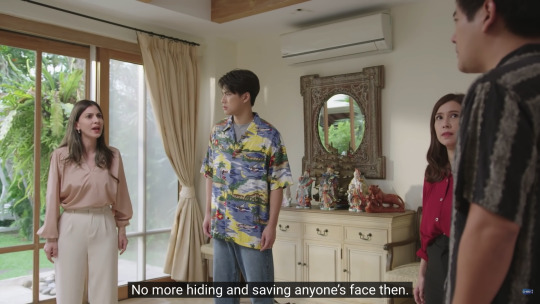
During my first Bad Buddy rewatch, I was so moved in fury by this scene that I had to blog about it as if I had never seen it before. There's so much encapsulated in this moment: the pressure that Dissaya has put on herself to keep the embarrassing secret that she lost a scholarship; the effort she made to keep Ming's theft of the scholarship a secret, to save his face, and the secrets she kept from Pran to save her face, and to keep up the façade of rivalry between the Jindapats and the Siridechawats. She was letting a whole hell of a lot loose in this moment, because the eternal pressure of saving face in Asian societies is, frankly, never-ending.
"Saving face" is an incredibly important notion in many Asian collectivist cultures. Saving face is about an individual or a family projecting an image of calm, cool collectedness and success, in order to not make waves within a collectivist society for any reason. If you are not working to seem like you are going with the flow of life, if you're not keeping up with the Joneses, the Kardashians, whoever -- you are not saving face. If you are in poverty, and are projecting an image of poverty, instead of pretending to be more wealthy than you are -- you are not saving your face or your family's face. If you allow yourself to get publicly defeated -- you are not saving face. Dissaya gave up a lot of her hard-earned reputation in the moment she confessed the truth in front of Pat and Pat's mother.
My Asian friends and I can click wordlessly into understanding the pressure of saving face; say that I didn't get good grades in school? I wouldn't be saving my parents' face. This kind of pressure to keep up with particular social dynamics within and external to family, within Asian societies, is a neverending drumbeat of pressure.
Besides saving face, there are many other Asian cultural touchpoints that were contained within Bad Buddy that my fellow Asian BBS stans and I noted. They include:
1) intergenerational/inherited trauma,
2) the unique nature of secret-keeping in Asian cultures/societies,
3) enmeshed family boundaries,
4) setting up children to compete against each other for the sake of familial pride,
5) patriarchy, sexism, and the reversal of sexism among next generations,
6) the inset/assumed roles of family members based on patriarchy and elder respect,
7) Assumed community within and external to one's family, usually based on where you live and where you go to school,
8) How one's identity is defined based on patriarchy and individualist vs. collectivist cultures,
9) How various cultures within an Asian nation live peacefully (or not) together (for example, what makes Pat and Pran different by way of Pat's Thai-Chinese heritage vs. Pran's ethnic Thai heritage),
and many, many more.
It'll be impossible, even over two posts, to analyze all of these cultural touchpoints, but a few of them engendered quite a bit of conversation among the BBS mini-village that I want to highlight. In this post, I'll focus on the continuation of my first BBS thesis on intergenerational/inherited trauma, the nature of secret-keeping in Asian societies, and will return briefly to the touchpoint of saving face.
One of the most devastating scenes for me in Bad Buddy is in my favorite episode, episode 10, when Pat (after he's learned, throughout the episode, of the extent of the lies that his and Pran's family have shared with their children) confronts his father about his father's demands to literally control Pat's emotions, the way in which Pat related to other people -- specifically Pran. Pat sums up a lifetime's worth of control in one sentence.
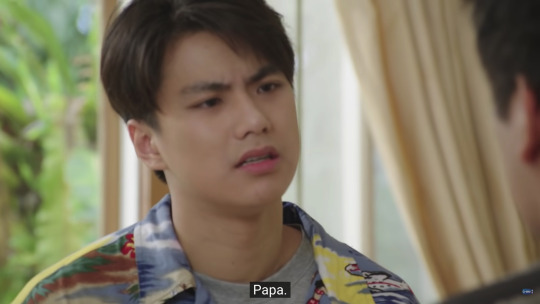
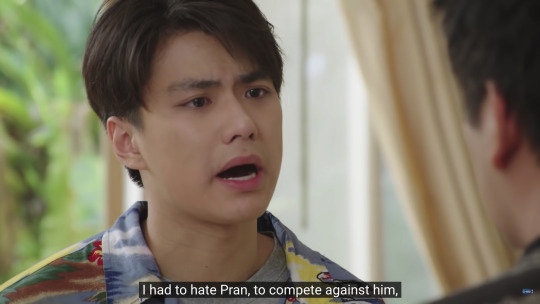
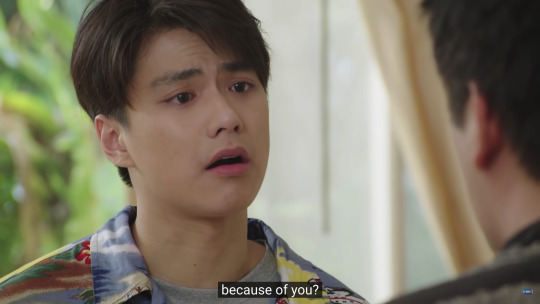
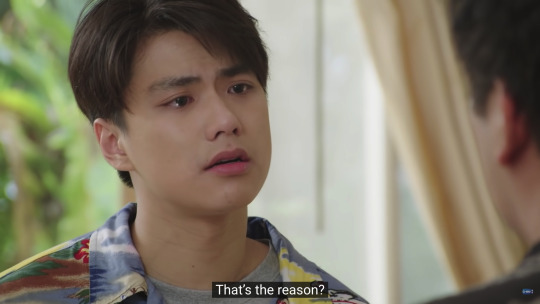
@telomeke noted in our ongoing group conversation that this notion of inherited trauma vis à vis Ming is particularly present in Asian societies, not just by way of familial expectation that we, as Asians, embody it and "take it" throughout our generations, as Pat realized up above -- but that ALL family members present are responsible for playing their roles within the framework of the inherited trauma. @telomeke noted in particular that exactly what Pat was doing to hate Pran, FOR his father? That was what Ming HAD to do for MING'S dad, when Ming schemed to get the scholarship from Dissaya. AND, Pat's mother, in consoling Pat, had to play the role of explainer -- which, as we know now, Pat ran away from to meet his beloved Pran on the rooftop before running away to the eco-village.
Pat running away from that moment? That was a huge symbol of the breaking of the inherited trauma that was given unto him by his parents both.
(@telomeke has actually written about their theory about how the Jindapats and Siridechawats ended up living next door to each other -- which seems SO STRANGE on the surface, consider Ming's and Dissaya's boiling hatred for each other -- and the theory links nicely within the framework of inherited trauma. Tel theorizes that Ming's father or grandfather may have actually gifted the house to Dissaya's family as a means of apologizing for Ming's deceit. In which case: the presence of the Siridechawats is a reminder, on an everyday basis, of Ming's folly to steal from Dissaya, which may explain why Ming in particular went so hard on Pat to triumph daily over Pran.)
We as a group unwound quite a bit on the nature of secret-keeping in Asian cultures. We know Bad Buddy relies on this cultural touchpoint at the end of the series: Pran and Pat have a full-fledged and committed relationship as a transparent secret, under the noses of Pat's and Pran's parents.
Secret-keeping....oh, man. I could not have lived a fully authentic life in America if I didn't keep a million secrets from my family while I was living out my own independent choices. I actually, literally, could not have gotten married, because the rule of my household was that I wouldn't date. I would just... get engaged. So I'd get engaged through, what, magic? Match-making? No: I'd have to find my partner through my own battle of social and familial conventions, literally against my family, to get to where I wanted to be in life, which was (gasp) married.
@neuroticbookworm illuminated more on this particularly from our shared Indian lens. She wrote,
Keeping your relationship secret from parents is sooooo ridiculously common in India (and I'm sure we can extrapolate to other Asian countries like Thailand). And the justification the children give themselves is always rooted in how they have a "duty" towards their parents, and that they will reveal their relationship after they have fulfilled their duties.
God, I LOVED that NBW brought up "duty" in this conversation. Because! Assumed within the coded language from Asian parents to children, and vice versa, is a sense that children MUST follow the dictates of their parents. 100%, full-stop.
The duties that NBW clarified in this particular conversation specified life demarcations such as "[w]hen I graduate, I'll tell my parents about my partner," and "[w]hen I graduate and get a job and can financially support myself in life, I'll tell my parents about my partner."
What's coded in these statements is a fear that the children will have to reveal to their parents that they were disobedient in the rules their parents set, that no dating shall occur until the time at which the parents rule it's okay. And at least within Indian frameworks, that period of it being "okay" is, more often than not, the period in which arranged matches are examined. Because, yes, that's still the rule in the high majority of Indian culture.
The revelation of that disobedience? That's bad-news bears. It indicates... everything: a lack of loyalty to the family; a lack of understanding the meaning of a child's role to listen to the parents as the parents are elders and therefore are the moral authority of the household; a lack of self-control (which is a huge deal -- that relates to saving face on behalf of the family); a lack of understanding the morals and ethics of saving oneself, in love and sex, before marriage, etc. Even if a family seems fully progressive on the outside, as an Asian, I'm conditioned to question that progressiveness -- as parents may hold different standards of acceptance for their children vs. other young people.
@telomeke expanded on disobedience for us -- connecting it back to the very important notion of "saving face."
I think there's something quite related to secret-keeping, but it's also to do with the ability of Asians, but also human beings in general, of being able to live with duality in life... and secret-keeping is part of it. This also ties in to the East and Southeast Asian preoccupation with the concept of "saving face" [as noted above]. A lot of families are able to live with the knowledge of dirty secrets, unsavory truths, as long as it's not brought into the light and confronted. I'm constantly reminded of this whenever I rewatch BBS Ep. 12 because it's clear both Ming and Dissaya KNOW their sons are in a relationship but it's not overtly admitted. In that way they (and more Ming I suppose) get to "save face" and not have to deal with the truth that their sons are being disobedient, consorting with the enemy, and because it's not in the open -- there is no dishonor brought to the family and to the elders.
God, I love the way Tel put this. That disobedience on the part of Pran and Pat would actually bring dishonor to their families -- because their families have put SO MUCH EFFORT into building their public AND private enmity their entire lives! It affected Chai's relationship with the families as an employee of both families. EVERYONE AT PAT'S AND PRAN'S SCHOOLS knew the guys were the "legendary rivals." And, of course, by being in rival faculties at the same university, the boys could continue this public enmity as well -- keeping up with the roles that were literally assigned to them by their parents.
If the boys disobeyed, they would bring dishonor to their families. Think about that -- and connect that with the heaviness that Pran walked away with after the rooftop kiss in episode 5, AND the weight of Pran's breakdown at the end of episode 10, when Pat assured him that they would run away together.
No matter what a Western viewer (and maybe even Asian viewers, wanting to see a dismantling of these paradigms) would want Pat and Pran to have by way of full openness of their relationships with everyone in their lives (because, in individualistic cultures, that self-driven openness is a given), Pran and Pat themselves knew that that couldn't be their reality vis à vis the social worlds they belonged to. So they kept their relationship a secret, in the end.
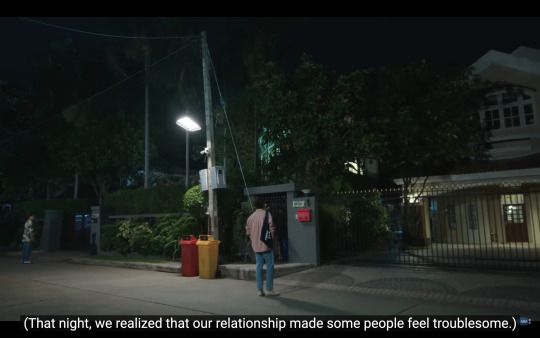
The secret that Pran and Pat keep about their relationship is strategic. It's certainly also a stress point: an older Pat asks an older Pran, at the end of episode 12, if he'll ever be able to walk through the front door of the Siridechawat house.
But this is the compromise -- within the larger-scale culture of secret-keeping in Asian societies, AND the private frameworks of the enmity that Dissaya and Ming established between themselves and their families years and years prior -- that will work best for Pat and Pran to preserve the sanctity of their relationship, which I talked about in part 2 of this meta series.
Pran and Pat do not have to publicly appear disobedient to the demands and pressures of their families. They do not have to make their families engage with each other. They do not have to make their families confront the mistakes that their parents made earlier in their lives. They can protect their families from their private and public follies. They can help their families keep and save face. And by doing all that? They can prevent their relationship from being threatened.
I feel this very deeply in my heart as an Asian-American. For the sake of my American spouse, I wanted to protect him from a lot of these pressures, and so I insisted on keeping a lot of our relationship secret from my folks. If I demanded full-blown, public acceptance from my parents? If I brought my "boyfriend" to parties, and introduced him as such with aunties and uncles -- especially if it wasn't indicated that we'd be permanent one day? Damn. No. I'd be embarrassing my folks, with the aunties and uncles saying to my folks, "dang, you can't control your daughter, huh? You let her do what she wants." That would mean my parents would lose face over their ability to control the lives of their children, and that's no bueno in our cultural terms. It would be on ME, as THEIR child, to uphold THEIR ability to save face, as much as its their own work.
Dissaya refers DIRECTLY to Pran doing this FOR HER when, in episode 10, she asks him, "did you forget to save my reputation?" It's brutal, daily work. And Pran goes BACK to keeping secrets in the end, because it would have been impossible, ultimately, for Dissaya to save face, AND for Pran to save Dissaya's reputation/face, if Pran were out with his relationship with Pat, thus proving his disobedience. It would be -- JUST -- better to keep the secret for all those involved.
As this post has gotten long, I'm going to continue talking more about these touchpoints in a second post. I'm driven to talk about this because I think much of the Western fandom might miss what us Asians are reading into shows like Bad Buddy through this coded language and engagement. I very much posit that Bad Buddy -- while it is first and foremost a queer show, made by queer Asians, about queer young men -- is so relatable to so many of us because we've faced similar struggles of survival, and we've faced threats to the sanctity of the love we have for other people by way of needed to fit into the roles set before us by previous generations.
So! With that, thank you for reading, and see you tomorrow, when I focus on competition, enmeshed family boundaries, patriarchy and sexism in Bad Buddy, and more if I can fit it in!
(Tagging @dribs-and-drabbles, @solitaryandwandering, and @wen-kexing-apologist by request! If you'd like to be tagged, please let me know!)
[Alright! Stay tuned for more, many more ruminations from the BBS Asian station tomorrow!
Here's the status of the Old GMMTV Challenge watchlist. Tumblr's web editor loves to jack with this list, so mosey on over to this link for the very latest version!
1) The Love of Siam (2007) (movie) (review here)
2) My Bromance (2014) (movie) (review here)
3) Love Sick and Love Sick 2 (2014 and 2015) (review here)
4) Gay OK Bangkok Season 1 (2016) (a non-BL queer series directed by Jojo Tichakorn and written by Aof Noppharnach) (review here)
5) Make It Right (2016) (review here)
6) SOTUS (2016-2017) (review here)
7) Gay OK Bangkok Season 2 (2017) (a non-BL queer series directed by Jojo Tichakorn and written by Aof Noppharnach) (review here)
8) Make It Right 2 (2017) (review here)
9) Together With Me (2017) (review here)
10) SOTUS S/Our Skyy x SOTUS (2017-2018) (review here)
11) Love By Chance (2018) (review here)
12) Kiss Me Again: PeteKao cuts (2018) (no review)
13) He’s Coming To Me (2019) (review here)
14) Dark Blue Kiss (2019) and Our Skyy x Kiss Me Again (2018) (review here)
15) TharnType (2019-2020) (review here)
16) Senior Secret Love: Puppy Honey (OffGun BL cuts) (2016 and 2017) (no review)
17) Theory of Love (2019) (review here)
18) 3 Will Be Free (2019) (a non-BL and an important harbinger of things to come in 2019 and beyond re: Jojo Tichakorn pushing queer content in non-BLs) (review here)
19) Dew the Movie (2019) (review here)
20) Until We Meet Again (2019-2020) (review here) (and notes on my UWMA rewatch here)
21) 2gether (2020) and Still 2gether (2020) (review here)
22) I Told Sunset About You (2020) (review here)
23) YYY (2020, out of chronological order) (review here)
24) Manner of Death (2020-2021) (not a true BL, but a MaxTul queer/gay romance set within a genre-based show that likely influenced Not Me and KinnPorsche) (review here)
25) A Tale of Thousand Stars (2021) (review here)
26) A Tale of Thousand Stars (2021) OGMMTVC Fastest Rewatch Known To Humankind For The Sake Of Rewatching Our Skyy 2 x BBS x ATOTS (re-review here)
27) Lovely Writer (2021) (review here)
28) Last Twilight in Phuket (2021) (the mini-special before IPYTM) (review here)
29) I Promised You the Moon (2021) (review here)
30) Not Me (2021-2022) (review here)
31) Bad Buddy (2021-2022) (thesis here)
32) 55:15 Never Too Late (2021-2022) (not a BL, but a GMMTV drama that features a macro BL storyline about shipper culture and the BL industry) (review here)
33) Bad Buddy (2021-2022) and Our Skyy 2 x BBS x ATOTS (2023) OGMMTVC Rewatch (The BBS OGMMTVC Meta Series is ongoing: preamble here, part 1 here, part 2 here, more reviews to come)
34) Secret Crush On You (2022) (on pause for La Pluie)
35) KinnPorsche (2022) (tag here)
36) KinnPorsche (2022) OGMMTVC Fastest Rewatch Known To Humankind For the Sake of Re-Analyzing the KP Cultural Zeitgeist
37) The Eclipse (2022) (tag here)
38) GAP (2022-2023) (Thailand’s first GL)
39) My School President (2022-2023) and Our Skyy 2 x My School President (2023)
40) Moonlight Chicken (2023) (tag here)
41) Bed Friend (2023) (tag here)
42) Be My Favorite (2023) (tag here)
43) Wedding Plan (2023)
44) Only Friends (2023) (tag here)]
#bad buddy#bad buddy meta#bad buddy the series#bad buddy the series meta#backaof noppharnach#aof noppharnach#ohmnanon#ohm pawat#nanon korapat#patpran#pat x pran#pran x pat#the bbs ogmmtvc meta series#turtles catches up with old gmmtv#the old gmmtv challenge#ogmmtvc#turtles catches up with thai BLs#turtles catches up with the essential BLs#asian intergenerational trauma#intergenerational trauma#asian themes in bad buddy#saving face in asian cultures#asian cultural touchpoints in bad buddy
63 notes
·
View notes
Text
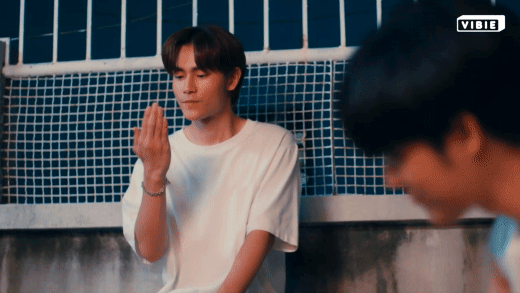
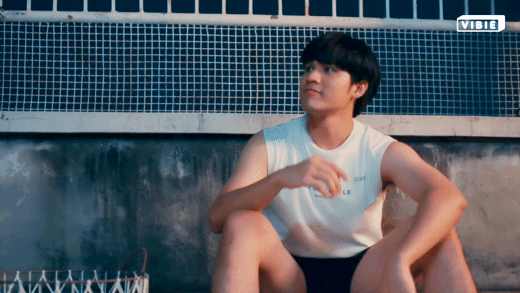




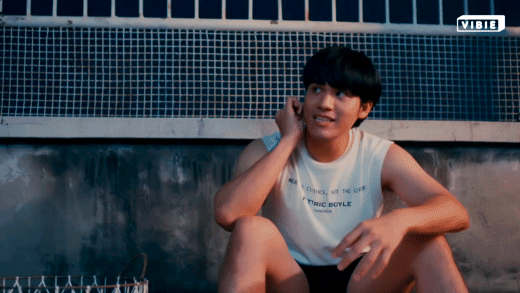
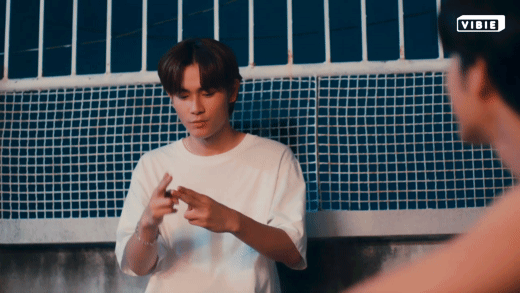
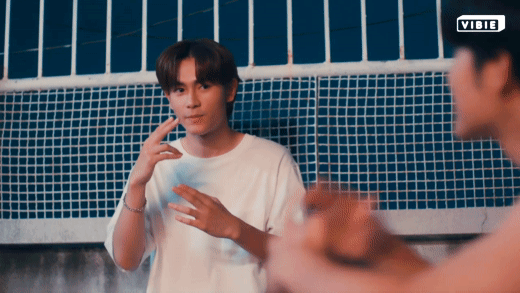

THAI SIGN LANGUAGE LESSONS. We have SIGN LANGUAGE LESSONS! We have Pluem teaching Kawin sign language and giving him a sign name and signing together so he can practice because Pluem is friends with a young Deaf boy because of his sister and Kawin just wants to know more. I am blown away. I destroyed. I do not know how to put into words how beautiful this is to see in a show. To see them teach each other a language with such respect and such care and such enthusiasm.
#ghost host ghost house#thai bl#thai bl drama#thaibl#bl drama#bl series#asianlgbtqdramas#asianlgbtqdramas gif#asian lgbtq dramas#asian lgbtq drama gif#asian lgbtq drama#pluemkawin#pluem x kawin#kawinpluem#kawin x pluem#thai sign language#sign language#i love it so much#and while i'm not sure Pluem should be giving a sign name#I don't actively know anything about Thai Deaf culture to comment
241 notes
·
View notes
Link
#really good to know#collection of all kinds of articles and researches about LGBTq media and BL / GL#lgbtq#bl drama#gl drama#yaoi#yuri#asian drama#thai bl#japanese bl#korean bl#fandom culture#science#free knowledge
9 notes
·
View notes
Text
“I wanna be the guy who gets to unsheathe his sword at the end of every episode. You know, when the screen freezes dramatically.”
- my partner who has only vague, osmosis-based knowledge of Asian drama tropes
#bl tropes#asian drama tropes#television transitions are fascinating cross-culturally#like legit i could write papers about this#i won't cause i have no time#but i could and i kind of want to#fandom studies#literary analysis ma
4 notes
·
View notes
Text

-Lao Wen, ¿estás nervioso?
-¿Por qué iba a estarlo?
-¿Por qué me agarras entonces?
-No te estoy agarrando.
#Zhou Zi Shu & Wen Ke Xing#zhou zishu#wen ke xing#word of honor cast#wen kexing#wenzhou#word of honor fanart#bl ships#fantasy#asianlgbtqdramas#asian lgbtq dramas#bl drama#lgbtlove#love#chinese boy#chinese drama#chinese men#chinese series#chinese culture#bl series#multi bl#chinese bl
8 notes
·
View notes
Text
This Is A Gay Asian Rant About BL Comments Made By Some Queer Westerners I See Sometimes.
So you know of those gays (usually white) that made dumb tiktok dancing to list of countries that legalized same sex marriage and list of countries that discriminate against LGBTQIA+ poeple as a way to say something racist. yeah i kinda got the same vibes from some comments regard how asian BL is homophobic just cause they don't live up to queer western standard. look, i'm not saying that some BLs and their creators don't deserve criticism regard how they capitalized/exploited queerness for an easy cash grab.
But people need to understand that Asian countries despite recent progress are still very much culturally conservatives. so when people says that thai bl is homophobic and all the characters looks like bunch of straight guys, which is true for some olders thai BLs i'm not gonna denied that. but after all this time and newer BLs generally being very queer and most of creators being out queer themself and poeple still making these comments, i'm annoyed.
And don't get me start on the actors. you don't know them! why are you making assumption and calling them queerbaiter just cause they acts in bl. like maybe they're straight, maybe they're not but what they're definitely doing is making queer content for you know, queer people here. so when you made halfass comments about their sexuality what do you think that made other queer people who still in the closet feels. and when you add the nationality to that, "these thai bl pair are this and that, this korean actor is so ungrateful for his bl past", etc. when our societies are still very much still in progress regard LGBTQIA+ acceptance. it make us living here feels fucking awful like somehow we're lesser queer than people in the west just cause we don't have citibank at pride or some shit.
And the shittiest in my humbled opinion are comments regard censored chinese bls. people do know like, that the creators making these bls are risking their livelihoods for this. that these shows getting make at all are miracles. yes it sucked that they're censored but they're still very much queer shows making by queer people who want to express thier queerness despite the chinese government being the chinese government. when people dimissing these shows as not belonging in queer media, you're also dimissing their creators and audiences as not belonging in the community.
Look what i want to say is that we're trying our best over here, and maybe our best are not up to your liking. the ways we talk and express our queerness maybe still can be perceived as problematic by western queer standard. but these media are our house and you're the guests. for people aren't shitty we appreciated that you're here engaging and loving our media, this is your home too and you're welcome in it. i can speak for myself that i very much love being here on tumblr and interacting with people from all over the world who love BL. but for people who are being shitty sometimes about asian bl.
YOU'RE THE GUESTS, BEHAVE!
#bl drama#thai bl#asian lgbtq dramas#personal rant#dumb boy rambled#japanese bl#taiwanese bl#korean bl#asian ql#asian bl series#asian bl dramas#ql dramas#bl fandom#ql meta#queer media#just fandom things#fandom#chinese bl
1K notes
·
View notes